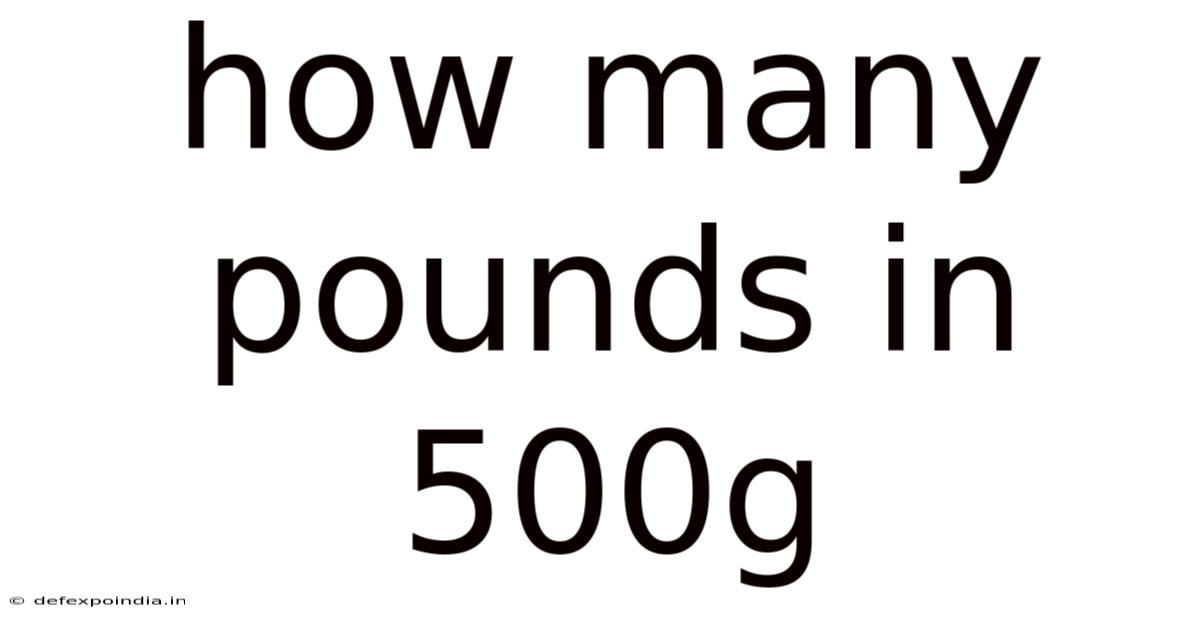How Many Pounds In 500g
defexpoindia
Sep 21, 2025 · 4 min read

Table of Contents
How Many Pounds are in 500g? A Comprehensive Guide to Metric and Imperial Conversions
Understanding weight conversions between the metric system (grams, kilograms) and the imperial system (ounces, pounds) can be tricky, especially when dealing with everyday quantities like groceries or cooking ingredients. This comprehensive guide will not only answer the question "How many pounds are in 500g?" but also provide you with a deeper understanding of the conversion process and related calculations, equipping you with the skills to confidently tackle similar conversions in the future.
Introduction: Understanding the Metric and Imperial Systems
Before diving into the specifics of converting 500 grams to pounds, let's briefly review the two systems involved. The metric system, based on units of 10, is predominantly used globally and includes units like grams (g), kilograms (kg), and tonnes (t). The imperial system, predominantly used in the United States and a few other countries, employs units like ounces (oz), pounds (lb), and stones (st). While both systems measure weight (or mass, more accurately), their units are fundamentally different, requiring conversion factors to move between them.
How Many Pounds are in 500g? The Direct Answer
500 grams is equal to approximately 1.102 pounds. This is the simple, direct answer to your question. However, understanding how we arrive at this answer is crucial for applying this knowledge to other conversions.
The Conversion Process: Step-by-Step Explanation
The conversion from grams to pounds requires a two-step process:
-
Grams to Kilograms: First, we convert grams to kilograms. There are 1000 grams in 1 kilogram. Therefore, to convert 500 grams to kilograms, we divide 500 by 1000:
500g / 1000g/kg = 0.5 kg
-
Kilograms to Pounds: Next, we convert kilograms to pounds. One kilogram is approximately equal to 2.20462 pounds. Therefore, to convert 0.5 kilograms to pounds, we multiply 0.5 by 2.20462:
0.5 kg * 2.20462 lb/kg ≈ 1.10231 lb
Rounding to three decimal places, we get 1.102 pounds.
Understanding the Conversion Factor: Why 2.20462?
The conversion factor of 2.20462 pounds per kilogram isn't arbitrary. It's derived from the fundamental definitions of the kilogram and the pound. These definitions have evolved over time, leading to slight variations in conversion factors depending on the source. However, 2.20462 is a widely accepted and accurate approximation.
Practical Applications: Examples in Everyday Life
Understanding this conversion is essential in various scenarios:
-
Cooking and Baking: Many international recipes use metric measurements. Knowing how to convert grams to pounds helps in accurately measuring ingredients. For example, a recipe calling for 500g of flour would require approximately 1.102 pounds of flour.
-
Shipping and Logistics: International shipping often involves weight specifications in pounds, while many products are weighed in kilograms during manufacturing. Accurate conversion is necessary for proper documentation and cost calculations.
-
Scientific Research and Engineering: Many scientific experiments and engineering projects require precise measurements, necessitating accurate conversions between metric and imperial units.
-
Personal Fitness and Nutrition: Tracking food intake or monitoring weight loss often involves comparing measurements across different systems.
Beyond 500g: Mastering Gram-to-Pound Conversions
Now that we've tackled 500g, let's generalize the process for any weight in grams:
Formula: Weight in pounds = (Weight in grams / 1000) * 2.20462
This formula allows you to quickly and easily convert any weight from grams to pounds. Just substitute the weight in grams into the formula, and you'll get the equivalent weight in pounds.
Frequently Asked Questions (FAQs)
-
Q: Is 1.102 pounds an exact conversion?
A: No, it's an approximation. The conversion factor 2.20462 is itself an approximation, resulting in a slightly rounded value for the final conversion.
-
Q: What if I need a more precise conversion?
A: You can use a more precise conversion factor, such as 2.20462262, or use online conversion tools that provide higher precision. However, for most everyday purposes, 1.102 pounds is sufficiently accurate.
-
Q: How do I convert pounds to grams?
A: To convert pounds to grams, reverse the process. First, multiply the weight in pounds by the reciprocal of the conversion factor (1/2.20462 ≈ 0.453592). Then, multiply the result by 1000 to get grams.
-
Q: Are there online converters available?
A: Yes, many websites and apps offer quick and easy conversion tools between grams and pounds. These can be helpful for quick conversions, but understanding the underlying principles is still beneficial.
Conclusion: Practical Knowledge for Everyday Use
Knowing how to convert 500g to pounds, and more generally, grams to pounds, is a valuable skill applicable across many fields. This guide has provided not only the answer but also a thorough understanding of the conversion process, empowering you to confidently handle similar weight conversions in your daily life. Remember the simple formula and the two-step process, and you'll be well-equipped to navigate the world of metric and imperial measurements with ease. From cooking to shipping, and beyond, accurate weight conversions are crucial for precision and efficiency. Mastering this skill will undeniably enhance your problem-solving abilities and expand your knowledge base.
Latest Posts
Latest Posts
-
How Many Ounces Is 60g
Sep 21, 2025
-
65 Inch Convert To Cm
Sep 21, 2025
-
How Big Is 7 5 Cm
Sep 21, 2025
-
22 Degrees Fahrenheit To Celsius
Sep 21, 2025
-
Convert 1 5 Cm To Mm
Sep 21, 2025
Related Post
Thank you for visiting our website which covers about How Many Pounds In 500g . We hope the information provided has been useful to you. Feel free to contact us if you have any questions or need further assistance. See you next time and don't miss to bookmark.